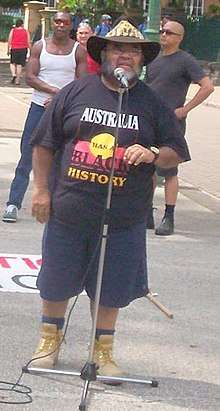Sam Watson (activist)
| Sam Watson | |
|---|---|
 Sam Watson, 2007 | |
| Born |
16 November 1952 Queensland, Australia |
| Occupation | Writer, filmmaker, political activist |
| Political party | Socialist Alliance |
| Children |
Samuel Wagan Watson, Nicole Watson |
Samuel William "Sam" Watson (born 16 November 1952) is an Aboriginal Australian activist and a socialist politician. Through work at the Brisbane Aboriginal Legal Service in the early nineties, Watson was involved in implementing the findings of the Royal Commission into Aboriginal Deaths in Custody. In December 2009, Watson was appointed a deputy director at the Aboriginal and Torres Strait Islander Studies Unit at the University of Queensland and taught two courses in Black Australian Literature.[1] He is also a writer and a filmmaker. He has received honours for his 1990 novel The Kadaitcha Sung.
Life
Watson is the grandson of Sam Watson who was of the Birri Gubba tribe. His grandfather worked in ring-barking camps and saved enough money to hire a lawyer to release him from the Aboriginal Protection Act. He was one of the first Aboriginal people to achieve this status. Watson's son is the poet Samuel Wagan Watson.
Career
Through work at the Brisbane Aboriginal Legal Service in the early nineties, Watson was involved in implementing the findings of the Royal Commission into Aboriginal Deaths in Custody. The film Black Man Down is a fictionalized exploration of the commission's findings.[2]
Watson has run as the candidate of the Socialist Alliance in the 2004 and 2007 federal election in Queensland. He was a candidate for that party at the 2009 state election for the seat of South Brisbane, running against the ALP state premier Anna Bligh. Watson received 344 votes (1.36%).[3] He represented the Socialist Alliance again as a candidate for the Senate in the 2010 federal election, where he received 3,806 votes (0.12%).[4]
In December 2009, Watson was appointed a deputy director at the Aboriginal and Torres Strait Islander Studies Unit at the University of Queensland and taught two courses in Black Australian Literature.[1] He is also a writer and a filmmaker. He won the National Indigenous Writer of the Year Award in 1991 for his 1990 novel The Kadaitcha Sung[5] and acclaim for his 1995 film Black Man Down.
In October 2009, the supermarket chain Coles announced that it would rename its house brand line of "Creole Creams" biscuits following a statement by Watson that "the word Creole comes from a period when people's humanity was measured by the amount of white blood they had in their bloodstream. This is the same kind of thought that underpinned horrific regimes like the Nazis."[6] This reading of the word "creole" was rejected by the Australian academic linguist Roland Sussex who could find no basis for this claim.[7]
Works
- Black Man Down, documentary film directed by Bill McCrow, April 1996
- The Kadaitcha Sung, Penguin Books, 1990. ISBN 978-0-14-011172-9, assisted by the Literature Board of the Australia Council
- Oodgeroo – Bloodline to Country, 2009, ISBN 978-0-908156-87-0
Further reading
References
- 1 2 Unit Staff Archived 26 October 2009 at the Wayback Machine., Aboriginal and Torres Strait Islander Studies Unit at the University of Queensland
- ↑ Alizzi, John (17 June 2014). "Making Aboriginal deaths in custody "history": On Royal Commissions". Right Now Human Rights in Australia. Retrieved 14 January 2017.
- ↑ 2009 State General Election – South Brisbane – District Summary Archived 3 October 2009 at the Wayback Machine., Electoral Commission Queensland
- ↑ Senate Results – Queensland, Australian Broadcasting Corporation
- ↑ "Author profile: Sam Watson". Macquarie PEN Anthology – Australian Literature Project. Allen & Unwin. Retrieved 14 January 2017.
- ↑ "Coles backs down over 'racist' biscuit" by Joshua Hoey, The Age, 27 October 2009
- ↑ "Whichever way, the cookie crumbles" by Roland Sussex, The Courier-Mail, etc supplement, p. 22, 5–6 December 2009
External links
- "Indigenous activist's long struggle for justice" by Tim Stewart, Green Left Weekly issue 599, 17 November 1993
- "Sam Watson: a life-long fighter against racism" by Karen Fletcher, Green Left Weekly issue 465, 19 September 2001
- "Sign up for Sam Watson", Green Left Weekly issue 681, 17 November 1993